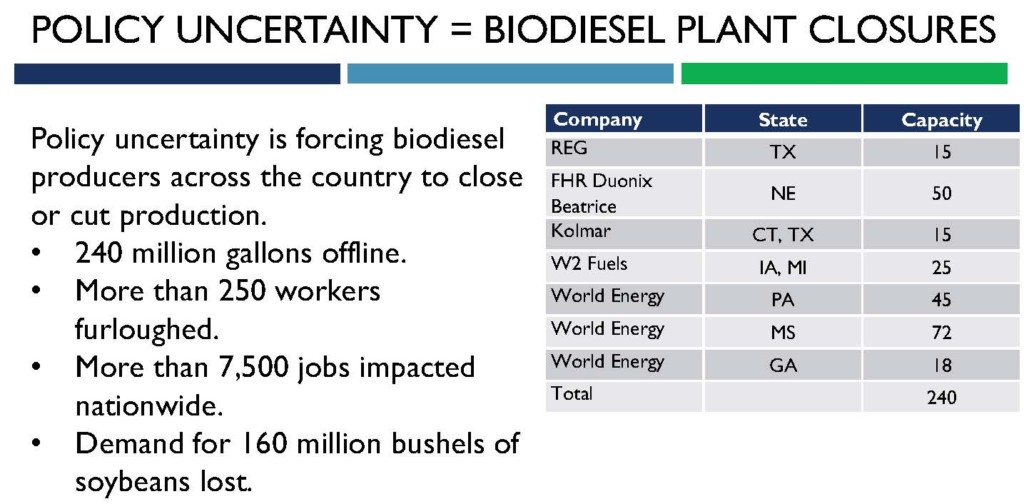By Tom Han
 ce and Angela Dansby
ce and Angela Dansby
It continues to be a challenging time for biodiesel, both commercially and on the federal policy front. President Trump and the Administration are dealing with backlash following the decision to grant an additional 31 retroactive Small Refinery Exemptions (SREs) in August under the Renewable Fuel Standard (RFS). The SREs undermine RFS volume requirements and result in reduced demand for biofuels, especially biodiesel.
Members of Congress, state governors and industry stakeholders made it known to President Trump the extent of the impacts that these decisions were having on the agricultural and biofuel industries, resulting in a series of meetings at the White House to discuss remedies. The most important action needed is a mechanism to ensure waived RFS volumes are reallocated, followed by increases in future RFS volumes for biomass-based diesel and Advanced Biofuel categories beginning in 2020. To be meaningful and provide certainty, the volume increases must be combined with the mechanism to ensure any volumes waived by retroactive SREs are reallocated. While there have been indications that President Trump will support the changes requested by the biofuel industry, details of the deal and its implementation are still being developed with no timeline for revealing them.
The RFS is not the only source of uncertainty. The biodiesel tax credit is still pending Congressional action on an extension. The $1.00 per gallon tax credit expired at the end of 2017 and the industry has had to deal with the uncertainty of when it will be reinstated. House and Senate leaders indicated their intent to pass a tax extenders package in 2019, although this is now likely at year end.
 Source: National Biodiesel Board
Source: National Biodiesel Board
Canola for Renewable Diesel
The U.S. Canola Association (USCA) and Canola Council of Canada (CCC) are initiating efforts to have the U.S. Environmental Protection Agency (EPA) update the RFS lifecycle analysis for canola to make its oil eligible as a feedstock for the production of “renewable diesel.” This diesel is produced through a different process than biodiesel and the current RFS feedstock approval for canola as an advanced biofuel does not allow for it as renewable diesel. Market demand for renewable diesel and industry investment has been increasing, creating a potential market opportunity for canola. The USCA and CCC have a preliminary meeting with the EPA on Oct. 2 to discuss the canola lifecycle analysis.
 Renewable diesel burns cleaner than regular diesel, releasing less carbon. Photo courtesy of Eugene Water & Electric Board.
Renewable diesel burns cleaner than regular diesel, releasing less carbon. Photo courtesy of Eugene Water & Electric Board.
Types of Diesel
What is the difference between renewable diesel and biodiesel? While both are made from organic biomasses, they differ in their sources and production processes, according to the U.S. Department of Energy. Here is a run-down of the three types of diesel:
Petroleum Diesel: Conventional (petroleum-based) fossil fuel is made from crude oil — hydrocarbons, organic compounds and small amounts of metal from millions of years ago. To make petroleum diesel, crude oil is removed from the ground, pumped into a refinery, and subjected to a heat- and pressure-based process called hydrogenation.
Biodiesel: Instead of fossil fuels, biodiesel is made exclusively from lipids, such as vegetable oils, animal fats, grease and algae, which are renewable. It is also processed differently than petroleum and renewable diesel using transesterification, giving it different physical properties and hence, different fuel specifications. In addition, biodiesel is generally blended with petroleum diesel at a 5 to 20 percent ratio.
Renewable Diesel: Like biodiesel, renewable diesel is made of non-petroleum, renewable resources. But unlike biodiesel, these resources include lipids and cellulosic biomass, such as crop residues, woody biomass and dedicated energy crops. Renewable diesel is processed like petroleum diesel with hydrogenation or other thermochemical and biochemical means, making it chemically similar. That allows it to be used in engines designed to run on petroleum diesel without blending.
Both biodiesel and renewable diesel have places in the market and trump petroleum diesel as more sustainable, environmentally friendly choices. Canola oil is an excellent feedstock for these valuable fuels, including as a waste product in renewable diesel due to its use in high volumes by many foodservice operations and value as a heart-healthy, edible oil. Its usage in renewable diesel allows consumers to benefit from it for both personal and environmental health: first from consumption and secondly in their vehicles.
Tom Hance is a biofuel policy expert at Gordley Associates in Washington, D.C. Angela Dansby is communications director of the U.S. Canola Association.